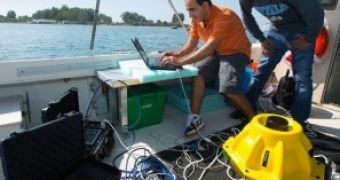You'd think that underwater Internet wouldn't be a priority, given the total lack of sub-ocean cities, but researchers from the University of Buffalo want to set it up anyway, to help with natural disaster detection if nothing else.
Any underwater Internet system would have to be wireless, because while there are some big and thick cables crossing the oceans, it's not practical or even possible to use physical mediums to transmit signal further down, and around the seabed.
Sadly, land-based wireless networks rely on radio waves, and since those work very poorly underwater, they can't be used here.
It's why the Navy and National Oceanic and Atmospheric Administration (NOAA), and other such agencies, use sound waves instead.
NOAA, for example, sends data from Tsunami sensors on the ocean floors to surface buoys using sound vibration.
The Buffalo University researchers used a similar model and tested it in Lake Eerie. They believe that, at least at first, underwater Internet would help predict tsunamis faster and save lives.
Fish and marine mammals would also be possible to monitor, as well as pollution levels, drug smuggling, by informing law officers right on their phones/tablets if there are makeshift submarines skulking about the seabed. Yes, as odd as it sounds, this actually happens regularly.
"A submerged wireless network will give us an unprecedented ability to collect and analyze data from our oceans in real time," Tommaso Melodia, UB associate professor of electrical engineering and the project's lead researcher, said in a statement.
"Making this information available to anyone with a smartphone or computer, especially when a tsunami or other type of disaster occurs, could help save lives. We could even use it to monitor fish and marine mammals, and find out how to best protect them from shipping traffic and other dangers. An Internet underwater has so many possibilities."
Melodia's framework would, primarily, solve the issue of sharing data between all these sound-based systems around the world. Not exactly the answer to our prayers for watching satellite/WB TV while surveying the ocean floor in a submersible, but it is the first step towards that.

 14 DAY TRIAL //
14 DAY TRIAL //